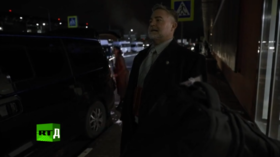Immigrants the scapegoats of economic woe

With the financial crisis raging, and the threat of recession looming, the British government says it can’t support immigration at its current level. Political analyst John Bourke looks into the implications of the move.
On Friday the newly appointed U.K. immigration minister, Phil Woolas, took his first step into the public spotlight by announcing that the number of immigrants “must be reduced”.
Apparently this is his contribution to helping solve the economic crisis and recession that Britain is facing.
In the government’s infinite wisdom it has decided that, when the going gets tough, what better than resort to the classic ploy of picking on a small, weak section within the country and dump part of the blame on them.
Little wonder then that this view was immediately supported by the infamous Labour Party MP for Birkenhead, Frank Field.
Field, who resigned as a minister in 1998, is the U.K. equivalent of Senator Joe Lieberman in the U.S. for his seemingly never ending ability to stab his own party in the back on policy differences.
A tireless critic of the government, this is the same man whose socialist credentials include the view that “problem families” should be made homeless to teach them a lesson and who, much akin to Lieberman, has not quite figured out yet that he is in the wrong political party in the first place.
“The immigration policy suitable for a boom is totally unsuitable for a recession,” he tells us.
That sounds intelligent enough on the surface, but the reality is that migrant workers have got nothing to do with the economic crisis the country is now facing. Picking them out for special treatment certainly will not do anything to elevate it either.
Phil Woolas justifies it on the basis that the country simply cannot sustain such a population growth, increasing to the figure of 70 million – this despite the fact that it is currently already at 61 million at the very least (65 by some estimates).
However, the clear implication here is that a recession necessitates a solution that involves cutting back on migrant workers, even though these people are frequently carrying out unskilled, manual labour for minimum wages – the very kind that most British people will not do.
This is exactly the area of work that is not where the problem lies in terms of growing unemployment.
Let’s be clear here. In April of this year, J.P. Morgan estimated that as many as 40,000 jobs could be lost in the U.K. in the especially hard-hit financial sector in the City of London.
Overall, businesses associated with the housing market, financial services and leisure are estimated to be the most vulnerable.
Guess who you won’t find many of working in any of them?
That’s right – migrant workers!
So let’s try to understand how this might work then. In order to keep the country’s population manageable, the brokers and economists from the City will now move out to the countryside to pick lettuce at seven pounds an hour. In the meantime, this will allow us to ship back home all the Eastern Europeans doing these jobs now?!
Of course the irony of this is that, mistakenly thinking that there will be nothing there for them, fewer workers are bothering to come to the U.K. anyway – precisely because no one is going to go to a country facing a recession to look for a job.
That does not take into account improving economies back home in places like Poland, which makes it more attractive now for workers to remain there anyway.
The British government’s own statistics seem to prove that very point. Applications for work permits from Eastern European nations new to the E.U. dropped by 14,000 in the second quarter of this year alone.
In time this could even cause a problem whereby there is a complete lack of unskilled workers to do these jobs at all.
What a delicious and even bigger irony that would be. British people will no longer need to complain about all those horrible foreigners taking their jobs, because they will be forced to get up off their couches and flip burgers and work as office cleaners themselves!













